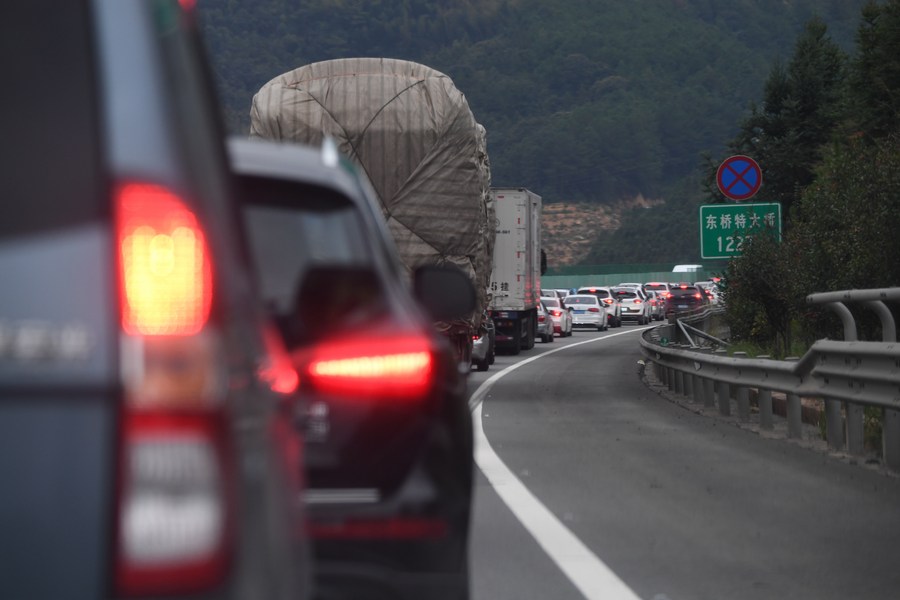


Photo taken on Oct. 6, 2020 shows a traffic jam on an expressway near Minqing County of Fuzhou City, southeast China's Fujian Province. (Xinhua/Song Weiwei)
"All local governments in China must not adopt a one-size-fits-all approach to stop residents from returning to their hometowns for Spring Festival reunions. They should provide convenience to those who need to go back," said Zhao Chenxin, a spokesperson for China's top economic planner the National Development and Reform Commission (NDRC), at a press conference on Wednesday.
In light of the recent sporadic outbreaks of COVID-19 in some northern and northeastern Chinese cities, the Chinese authorities have advised people to avoid the annual holiday travel rush to prevent the spread of the virus.
"The policy of encouraging people to stay where they work for the upcoming Spring Festival is not mandatory," the official said, adding people from medium and high-risk regions must adopt the policy, but it is only recommended to do so for low-risk areas.
China is facing rising demand for virus testing as peak travel season approaches, said Zeng Yixin, deputy head of the National Health Commission (NHC), urging local authorities to improve their testing capacity and explore ways to lower the testing cost and facilitate people being tested.
According to the NHC, China's daily testing capacity for COVID-19 has surpassed 15 million samples.
"Our testing capacity is even stronger when we conduct pool testing, for example, five or 10 samples in one batch," said Zeng, at the press conference.
The Chinese government is striving to accomplish the goal of vaccinating 50 million people in the high-priority group against the coronavirus before the start of the peak Chinese New Year travel season.
Zeng said that as of Tuesday, China had vaccinated 22,767,000 people, and the vaccination drive was progressing steadily.
With more people expected to ring in the Lunar New Year without their families, the demand for deliveries is going up. In order to meet the higher demand, the government will cancel all the restrictions for commodity transportation in the low-risk areas, said Wang Yang, chief engineer of the Ministry of Transport.
The Ministry of Commerce also said it will release 20,000 to 30,000 tonnes of pork from central reserve on weekly basis to ensure the supply and stabilize the market price during the holiday season.
At the same time, local communities are being urged to pay more attention to the empty-nest elderly people and the left-behind children, who might not expect their parents to come home this year.
Before the holiday, all the community workers are required to conduct a survey on the number and living situation of all the elderly and children in need to make sure that they have enough resources to live through the tough time during the pandemic.
 Fire brigade in Shanghai holds group wedding
Fire brigade in Shanghai holds group wedding Tourists enjoy ice sculptures in Datan Town, north China
Tourists enjoy ice sculptures in Datan Town, north China Sunset scenery of Dayan Pagoda in Xi'an
Sunset scenery of Dayan Pagoda in Xi'an Tourists have fun at scenic spot in Nanlong Town, NW China
Tourists have fun at scenic spot in Nanlong Town, NW China Harbin attracts tourists by making best use of ice in winter
Harbin attracts tourists by making best use of ice in winter In pics: FIS Alpine Ski Women's World Cup Slalom
In pics: FIS Alpine Ski Women's World Cup Slalom Black-necked cranes rest at reservoir in Lhunzhub County, Lhasa
Black-necked cranes rest at reservoir in Lhunzhub County, Lhasa China's FAST telescope will be available to foreign scientists in April
China's FAST telescope will be available to foreign scientists in April "She power" plays indispensable role in poverty alleviation
"She power" plays indispensable role in poverty alleviation Top 10 world news events of People's Daily in 2020
Top 10 world news events of People's Daily in 2020 Top 10 China news events of People's Daily in 2020
Top 10 China news events of People's Daily in 2020 Top 10 media buzzwords of 2020
Top 10 media buzzwords of 2020 Year-ender:10 major tourism stories of 2020
Year-ender:10 major tourism stories of 2020 No interference in Venezuelan issues
No interference in Venezuelan issues
 Biz prepares for trade spat
Biz prepares for trade spat
 Broadcasting Continent
Broadcasting Continent Australia wins Chinese CEOs as US loses
Australia wins Chinese CEOs as US loses